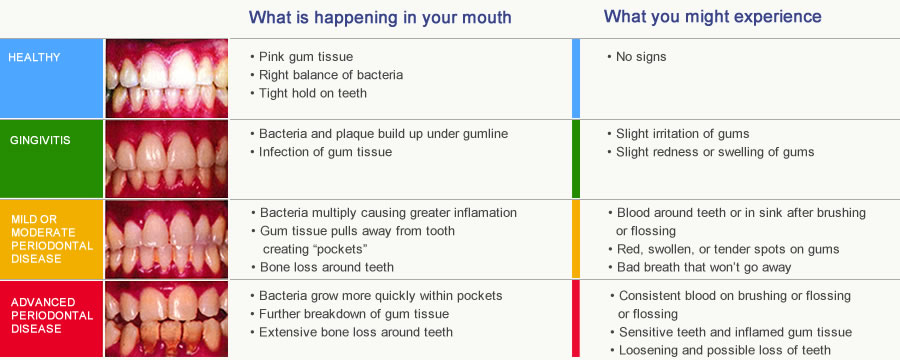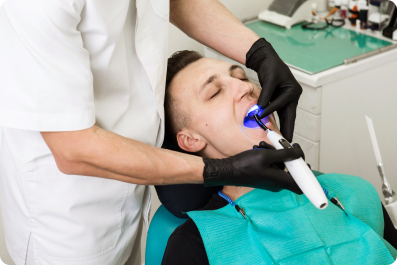Effective Gum Disease Treatment to Restore Your Healthy Smile in Boardman, OH
Gum disease is one of the most common dental problems, yet many people don’t realize they have it until significant damage has occurred. What starts as mild gum inflammation can quickly progress into a serious infection that threatens both your oral health and overall well-being. Fortunately, our experienced Boardman, OH dentist, Dr. Robert Perrott can treat gum disease when it’s caught early.
If you’re in Boardman, Poland, Austintown, Struthers or the surrounding areas, Dr. Robert Perrott at Perrott Dentistry offers advanced gum disease treatments to help you regain a healthy smile.Whether you’re experiencing bleeding gums, bad breath, or gum recession, contact Dr. Perrot by calling (330) 726-0090 for quality care and to prevent long-term complications.
Why Patients Choose Perrott Dentistry to Combat Gum Disease

Additionally, the friendly and professional staff at Perrott Dentistry is dedicated to making every visit as comfortable as possible. Many patients, like Jay Holly, highlight the warm, welcoming atmosphere of the office:
“This office and staff are really sweet. I had not been a huge fan of having to go to the dentist but from my very first experience here, my nerves have been set on ease! I’ve had mostly cleanings, but there was a time where I had an old filling repaired and some work had to be done to it! I have ZERO complaints even with that. The experience was pleasant and free of any discomfort. So if you’re in need of some great dental care, give this office a call!”
Whether you need gum disease treatment, a routine check-up, or any other dental care, patients know they can trust Perrott Dentistry for exceptional service and a pain-free experience.
What Is Gum Disease?
Gum disease, or periodontal disease, is an infection of the gums caused by bacterial buildup around the teeth. It starts with gingivitis, a mild inflammation of the gums, and can progress to periodontitis, a severe condition that damages the bone and tissue supporting the teeth. If left untreated, gum disease can lead to tooth loss and other serious health problems.
The primary cause of gum disease is plaque, a sticky film of bacteria that forms on teeth. When plaque isn’t removed through proper brushing and flossing, it hardens into tartar, which irritates the gums and triggers infection. Over time, the gums begin to pull away from the teeth, creating pockets where bacteria thrive, leading to further damage.
Benefits of Gum Disease Treatment
- Reduced risk of tooth loss: Gum disease is one of the leading causes of tooth loss in adults. Treating gum disease can prevent the progression of the disease and save your teeth.
- Improved oral health: Gum disease treatment can help improve your overall oral health. By reducing inflammation and removing harmful bacteria, you can prevent future dental problems.
- Fresher breath: Gum disease often causes bad breath. Treating the disease can help eliminate the odor-causing bacteria and improve your breath.
- Reduced risk of systemic health problems: Gum disease has been linked to a number of systemic health problems, including heart disease, diabetes, and stroke. Treating gum disease can help to reduce your risk of developing these conditions.
- Improved confidence: Gum disease can cause embarrassment and self-consciousness due to visible symptoms like bleeding gums and bad breath. Treating the disease can improve your confidence and self-esteem.
- Improved comfort: Gum disease can cause discomfort, pain, and sensitivity. Treating the disease can help to reduce these symptoms and improve your comfort.
- Long-term cost savings: Treating gum disease early can help to prevent more serious and expensive dental problems in the future. By investing in gum disease treatment now, you can save money in the long run.

What Causes Gum Disease?
Gum disease is primarily caused by plaque buildup—a sticky film of bacteria that forms on teeth and gums. When plaque isn’t removed through proper brushing and flossing, it hardens into tartar, which irritates and inflames the gums. Other contributing factors include:
- Poor oral hygiene – Not brushing and flossing regularly allows bacteria to thrive.
- Smoking and tobacco use – Reduces blood flow to the gums, slowing healing.
- Genetics – Some people are more prone to gum disease due to family history.
- Diabetes – High blood sugar levels can increase the risk of infections.
- Hormonal changes – Pregnancy, menopause, and other hormonal shifts can make gums more sensitive.
- Certain medications – Some drugs reduce saliva production, which helps protect against bacteria.
Recognizing the early signs of gum disease can help you seek treatment before it progresses.
Signs and Symptoms of Gum Disease
Gum disease often starts with mild symptoms that are easy to ignore. However, as it worsens, the effects become more severe. Watch out for these warning signs:
Early Stage: Gingivitis
- Red, swollen, or tender gums
- Bleeding when brushing or flossing
- Bad breath that doesn’t go away
- Gums pulling away slightly from teeth
Advanced Stage: Periodontitis
- Deep pockets forming between gums and teeth
- Loose or shifting teeth
- Pain while chewing
- Receding gums, making teeth appear longer
- Pus between teeth and gums
If you notice any of these symptoms, don’t wait—schedule a consultation with Dr. Perrott to prevent further damage.
Gum Disease Treatment Options at Perrott Dentistry

Professional Dental Cleaning
If you have gingivitis, a professional dental cleaning at Perrott Dentistry may be enough to remove plaque and tartar, allowing your gums to heal. Regular cleanings every six months can prevent gum disease from developing.
Scaling and Root Planing (Deep Cleaning)
For mild to moderate gum disease, Dr. Perrott may recommend scaling and root planing. This deep-cleaning procedure removes tartar from below the gumline and smooths the root surfaces to help gums reattach to the teeth.
Laser Gum Therapy
Modern laser treatments target infected areas with precision, reducing bacteria and promoting faster healing. This minimally invasive procedure is an excellent option for patients in Boardman, OH, and nearby areas who want a less painful alternative to traditional gum surgery.
Antibiotic Therapy
In some cases, antibiotics may be prescribed to control bacterial infection. These can be applied directly to the gum pockets or taken orally to fight gum disease-causing bacteria.
Surgical Treatments (For Severe Cases)
When gum disease has progressed to advanced periodontitis, surgical intervention may be necessary. These procedures include:
- Flap Surgery – Lifting the gums to remove deep plaque and tartar, then securing the gums back in place.
- Bone and Gum Grafts – Rebuilding lost bone or gum tissue using grafts to restore support for the teeth.
If you have severe gum disease and live in Boardman, Canfield, or the surrounding areas, Dr. Perrott offers periodontal care to help restore your oral health.
Preventing Gum Disease: Simple Steps for a Healthier Smile
After treating gum disease, prevention is key to keeping your gums healthy. Here’s what you can do:
Brush and Floss Daily
- Brush twice a day using fluoride toothpaste.
- Floss at least once a day to remove plaque between teeth.
Visit Your Dentist Regularly
Routine checkups and cleanings at Perrott Dentistry in Boardman, OH help detect gum disease early and keep your teeth and gums in top shape.
Quit Smoking
Tobacco use is a major risk factor for gum disease. Quitting can improve gum health and prevent further damage.
Maintain a Healthy Diet
Eat foods rich in vitamins C and D, leafy greens, and lean proteins to support strong gums. Avoid sugary snacks and acidic drinks that promote bacterial growth.
Use Antibacterial Mouthwash
Rinsing with an antimicrobial mouthwash can help reduce plaque and keep harmful bacteria under control.
Frequently Asked Questions
How do I know if I have periodontal disease?
Symptoms of periodontal disease include redness, swelling, bleeding gums, and tenderness of the soft tissue. If you‘re experiencing any of these symptoms, see your dentist for an evaluation.
Is gum disease contagious?
No, gum disease is not contagious. However, bacteria that cause gum disease can be spread through saliva, so it’s important to practice good oral hygiene habits to prevent the spread of bacteria and gum infection.
Can gum disease cause other health problems?
Yes, gum disease has been linked to other health problems, including heart disease, stroke, and diabetes. Maintaining good oral hygiene and treating gum disease promptly can help reduce the risk of these other health conditions and complications.
Take Action to Protect Your Oral Health at Perrott Dentistry
Gum disease is a serious condition, but it’s treatable with the right care. By recognizing the signs early and seeking professional treatment, you can prevent tooth loss and maintain strong, healthy gums.
If you’re experiencing symptoms of gum disease in Boardman, Austintown, Struthers, Campbell or the surrounding areas, schedule a consultation with Dr. Robert Perrott at Perrott Dentistry today by calling (330) 726-0090. Don’t let gum disease take away your smile—take the first step toward healthier gums now!

